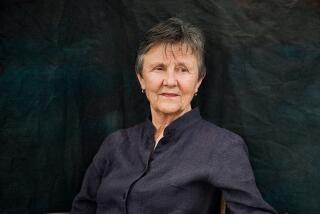Tuned In--Again
- Share via
Introspection may not be what some radio listeners most expect from Bonnie Grice, but then being suddenly and unexpectedly between jobs tends to encourage personal reflection.
In September, Grice’s employment as one of the preeminent on-air personalities at the classical music station KUSC-FM (91.5)--loved and loathed with equal passion for her free-spirited, multicultural approach--seemed certain to extend into its eighth year. Then, in a series of well-publicized events, KUSC--licensed by the University of Southern California--began a retreat from programming that some thought made the classics more accessible and others thought was sacrilege.
Grice’s husband and station president Wallace A. Smith resigned and a few days later Grice announced her own resignation, effective at the end of October. The station converted her final weeks into a leave of absence, however, taking her off the air in early October. Last week, rival KKGO-FM (105.1) signed her to host two new Sunday evening shows.
“I think I’m over the stunned disbelief phase,” Grice, 41, says of the recent tumult. “It’s kind of like the steps in reacting to the death of a friend. There’s the anger phase, there’s a release phase, an acceptance phase and then a moving on and feeling those good memories of that person.”
What does she think sank her and her husband’s experiment in loosening up the KUSC airwaves? “I get so tired of speculating about what the university or others want,” is all she’ll say.
“I’ve really tried in the last couple of weeks to look at the good parts of working there, and there were many. Communicating so dramatically with some of the listeners--the letters that I’ve gotten have been very moving. That helped a lot.”
Letters, indeed, are something she has an almost magical ability to inspire. Bonnie Grice may be between jobs, but you couldn’t prove that at the post office. Mountains of mail about the controversial host came to her station, this newspaper and probably any other possible forum for venting opinions on the L.A. classical music scene. She talked too much on-air, the letters charge, (or made things interesting); she bastardized works by excerpting them (or kept listeners tuned in); her taste wasn’t “classical” enough (or she broadened minds and record collections).
Now, with more than a week to go before her debut on KKGO-FM, that station has already learned something about the correlation between Grice and a glutted mail room.
“You know, the interesting thing about Bonnie is that she has engendered very strong feelings. Either people like her very, very much, or they dislike her very, very much,” says KKGO general manager Saul Levine. “I want to assure our audience that Bonnie is going to comply with our philosophy. Give her a chance, please, before rushing to judgment. Bonnie is going to deliver.”
Grice evinces enthusiasm and determination about her new job in equal measure. “When Saul called I was really thrilled to have a chance to work at his station, because of its prestige and his commitment to the classics. I’ve always felt that commitment myself--it’s just that we were doing it differently.
“People have accused me of being a little Pollyanna anyway, so I might as well go with that. My eyes are wide open and I’m excited. I wanted to break into commercial radio in some way. I’ve enrolled in voice-over workshops, hopefully to do some commercial work that way, and then KKGO came along.”
As far as the differences between public and commercial radio go, Grice will take them as they come. “I want to show that I can do different things,” she says. “The differences are, first of all, the amount of talk--a lot less. However, I will be doing this interview program on Sunday nights so I will be doing some talk. They’ve given me a lot of flexibility--they said to me, ‘We’re hiring you because we want you to be you,’ but within the classical area [only].”
*
This interview program, called “Classical Currents,” is scheduled to air at 7 p.m. starting Nov. 10. Grice will be basically her own producer and writer, and she hopes to book familiar friends in her first weeks, such as pianist Mona Golabek, Gay Men’s Chorus director John Bailey and members of the Los Angeles Philharmonic. The key musical component of the show will be exploring her guests’ favorite pieces.
“I’ll never forget the first time I did an interview like that,” Grice says. “It was with Robert McDuffie, the violinist, and he picked a Beethoven and Bernstein album that he had just done and some Allman Brothers, from the album ‘Eat a Peach,’ which we played. The phones just went nuts! We’ll explore the kinds of things that people on the show like, but we’ll stick pretty strictly within the classical area.”
Airing at 8 p.m. immediately after the interview program will be the “Sunday Evening Opera.” The proposal to host this program came as a surprise to Grice, but she has the credentials for the job. She even wrote the libretto for an opera based on Virginia Woolf’s novel “Mrs. Dalloway,” which composer Libby Larsen set and Lyric Opera Cleveland produced three summers ago to mixed national reviews.
“I’ve always had a love of opera,” she says. “I was a voice major, so I sang--not very well--but I sang some. So I think that I come from a good place, as far as hosting an opera show goes.” She has also been asked to write an article for Opera Pacific for one of its programs.
Sitting around an old farm table in her Long Beach home--Grice shares her husband’s keen interest in antiques of the type that she calls “American homey”--Grice exudes the warmth, humor and enthusiasm that earned her a legion of fans to balance the angry detractors. But she also feels saddened by the demise of the format she and her husband had pioneered.
“I still feel that what we were trying to do in opening up the music and trying to encourage new audiences for the music was right,” she says quietly. “I said to my listeners before I left KUSC that ‘a dream deferred is not a dream denied.’ I still believe that somewhere in the world, maybe in the future, there’s a place for a radio format like what we were doing. I wouldn’t say it is the only way to go, but we’ve got to do something to help this art form.
“I look back and feel proud of the work that I did, and I look forward to whatever adventures lie ahead and whatever kind of radio is out there for me.”
More to Read
The biggest entertainment stories
Get our big stories about Hollywood, film, television, music, arts, culture and more right in your inbox as soon as they publish.
You may occasionally receive promotional content from the Los Angeles Times.










